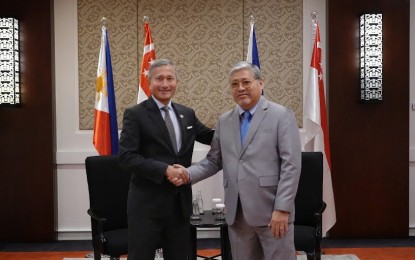
CARBON CREDITS TRADING. Singapore Foreign Minister Vivian Balakrishnan and Foreign Affairs Secretary Enrique Manalo discuss the two nations' bilateral relations during a meeting at the Sofitel Manila on Tuesday (April 16, 2024). In a joint press conference, Balakrishnan said the Philippines and Singapore are planning to form a working group that will discuss possible cooperation on carbon credit market. (Photo courtesy of Secretary Manalo)
MANILA – The Philippines and Singapore are planning to form a working group that will discuss possible cooperation on carbon credit market, visiting Singapore Foreign Minister Vivian Balakrishnan said Tuesday.
In a joint press conference at Sofitel Manila, the Singaporean top diplomat said he discussed with Foreign Affairs Secretary Enrique Manalo the establishment of a framework to trade carbon credits that is compliant with the Paris Agreement.
Balakrishnan is optimistic this future partnership would open up “new growth areas and opportunities for the Philippine economy, whilst expanding Singapore's businesses access to the available carbon credits that will be generated”.
“I believe this is in the mutual interest of both countries given the global need to transit towards net carbon zero. The Philippines in my view has great potential in this area,” he said.
Carbon credits are units obtained from entities that remove or reduce greenhouse gas emissions.
The United Nations Climate Change said companies or individuals can purchase and use these credits to compensate for their greenhouse gas emissions or to simply support climate action.
One tradable carbon credit equals one tonne of carbon dioxide or the equivalent amount of a different greenhouse gas reduced.
Stronger economic relations
Meanwhile, Singapore is also looking to expand energy cooperation with the Philippines, including at the regional level.
Balakrishnan said the connection between the Philippines, Indonesia, and Malaysia opens up opportunity for cross border energy trading, similar to the Singapore-Thailand-Malaysia-Lao PDR power integration project.
“If you put these two networks together, you in fact, get the beginning of a very significant ASEAN power,” he said.
“Singapore and the Philippines will also work closely together in other emerging areas of energy. This will be a learning journey for both of us as we transition into the economic and energy transformations,” he added.
In addition, Balakrishnan said Singapore is keen to explore collaboration on “future-oriented” areas, including the green economy, smart and sustainable infrastructure, innovation, artificial intelligence, and startups, among others.
He said Singaporean businesses remain confident in the prospects of the Philippines economy and are, in fact, one of the country’s top investors.
“Certainly, it is a vote of confidence in the Filipino people and the Philippine economy. Our investments from Singapore businesses have included areas like real estate, hospitality, telecommunications, transport, and logistics,” he said.
Balakrishnan's visit comes as the Philippines and Singapore mark 55 years of diplomatic relations.
This also follows the successful convening of the 6th Informal Consultations on the Philippines-Singapore Action Plan last February 2024. (PNA)
